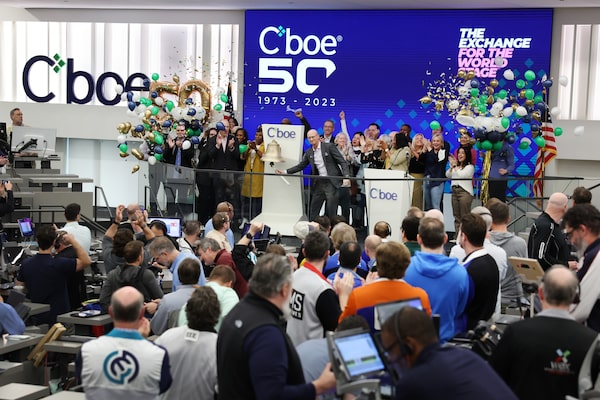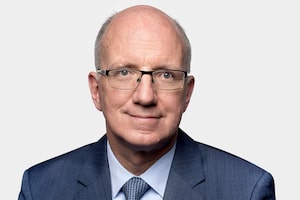
A bell is rung to celebrate the close of trading in the S&P options pit at the Cboe Global Markets exchange on April 26 in Chicago. Founded in 1973 as the first U.S. exchange for listed options, Cboe Global Markets was celebrating its 50th anniversary with the closing ceremony.Scott Olson/Getty Images
After building the country’s third largest equity trading platform with a series of acquisitions, Cboe Global Markets Inc. CBOE-A is scouting for opportunities to move into the rapidly growing Canadian options market, a strategy that fits with the Chicago-based exchange’s core international business.
In Toronto this month for meetings with clients and staff, Cboe (insiders pronounce it “sea-bow”) chief executive officer Edward Tilly said in an interview the company has exceeded internal growth targets since buying trading networks MatchNow in 2020 and Neo Exchange in 2022.
Cboe’s clients are both investors and companies raising money, and Mr. Tilly said these customers appreciate being able to trade or access capital anywhere in the world, on a single platform.
In June, for example, Toronto-based Abaxx Technologies Inc. ABXXF applied to trade its shares, which first listed on the Neo Exchange in 2020, on Cboe’s U.S., European, Australian and Asian platforms. Abaxx is backed by mining entrepreneur Robert Friedland.
A year-long drought in initial public offerings has slowed new listings business for all exchanges, including Cboe’s domestic platform. However, Mr. Tilly said the company never predicates its growth strategy on uncontrollable events such as IPOs. He said: “We are building our Canadian business to be resilient and sustainable.”
When it comes to serving investors, from large institutions to individuals, Mr. Tilly said, “Our vision is that every wallet should have access to every investment strategy.”
Canada is one of the few regions where Cboe doesn’t dominate the options market.
TMX Group Ltd. X-T, parent to the Toronto and Montreal exchanges, currently enjoys a monopoly on both listing equity options and the essential back-office task of clearing trades in the securities, which takes place at the TMX-owned Canadian Derivatives Clearing Corp.
Last year, TMX posted revenue of $261-million from derivative trading and clearing, which includes equity options along with fixed income and currency contracts. Montreal Exchange-based trading in options on stocks, equity indices and ETFs soared in the past six years, with the average daily trading volume rising 9.4 per cent annually. The spike reflects, in part, increased interest from day traders who buy and sell relatively volatile options as part of their strategies.
TMX Group reports record $299.1-million in first-quarter revenue despite slowing market trading
Cboe’s roots are in the options market – the company was created in 1973 as the Chicago Board Options Exchange. Mr. Tilly started on the exchange in 1987 as a trading floor clerk, and has risen through the ranks to run a company with a US$15.8-billion market capitalization.
In most regions, Cboe lists stocks, then offers options and other derivatives based on the securities traded on its exchanges. Its the derivatives that generate the biggest trading volumes. Last year, 56 per cent of Cboe’s US$3.96-billion in revenue came from its U.S. options division, its single largest business, while 22 per cent came from North American equity trading.
Mr. Tilly said over time, Cboe plans to challenge TMX by expanding into the options market in Canada, and the preferred path forward would include also owning and operating the back office that clears options trades. The exchange’s executives are still working on how and when to make a move.
“Innovation in the options, innovation in all markets, is a core part of our DNA,” said Mr. Tilly. He said client interest in options should continue to expand, no matter how the underlying securities perform, as more investors learn to navigate the market, and corporate executives such as risk managers increase their use of derivatives.
Trading in equity options is regulated by Quebec’s Autorité des marchés financiers (AMF), and the government agency would need to approve any new clearing house for settling contracts. Mr. Tilly said one of Cboe’s priorities is building and maintaining strong relationships with regulators around the world.
If an arms race breaks out in the Canadian options market, with the U.S. exchange operator going up against TMX, Cboe has considerable firepower and expertise. Last year, TMX traded an average of 605,000 derivative contracts each day, a new record for volume. The Cboe’s average volume was 10.9 million options contracts daily.
 Andrew Willis
Andrew Willis